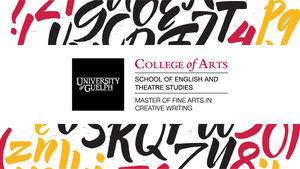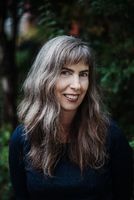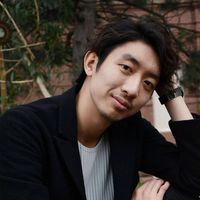"The Conditions That Foster Creativity": Catherine Bush and Sheung-King Discuss Guelph's MFA in Creative Writing
Imagine having a year or two totally devoted to your writing, surrounded by fellow-minded emerging writers with whom to discuss work and craft, and experienced teachers on hand to guide you and offer feedback. That's the reality for MFA students and, in Canada, The University of Guelph's MFA in Creative Writing is amongst the very best. Founded in 2006, they've grown leaps and bounds, turning out published and acclaimed writer after writer, including Zoe Whittall, Jael Richardson, and Canisia Lubrin, to name just a few.
We're excited to welcome Associate Professor and Coordinator of the MFA programme Catherine Bush, and recent alumnus Sheung-King (also called Aaron Tang) to discuss the programme, the MFA experience, and more here today.
And if you're considering taking the plunge and applying to an MFA, Guelph's programme is currently accepting applications until December 7th. Check out the website for full information on how to apply.
From Catherine Bush:
Sheung-King is a recent graduate of the University of Guelph Creative Writing MFA (in 2018). He has just published his first novel, You Are Eating an Orange. You Are Naked. (Book*hug Press).
The novel, which began life as Sheung-King’s MFA thesis, features a young translator who travels abroad, often with an unnamed lover, whom he addresses in the second person. Told in a series of short chapters, the novel offers intimate meditations on love, confronts Orientalism, retells Chinese folk tales, and includes untranslated Cantonese and Mandarin. It’s a beguiling, lyrical work that affords both emotional and intellectual pleasures; it heralds the arrival of an exciting and original new voice capable of grappling with the essential and interstitial in global lives today.
As the long-time Coordinator of the Guelph Creative Writing MFA, I asked Aaron to discuss his time in the program, which has been around since 2006. The Guelph Creative Writing MFA admits 12-14 students into each fall cohort, a culturally diverse group comprising writers across genres, currently including creative nonfiction, drama, fiction, hybrid forms, poetry, and screenwriting. The program, part of the University of Guelph’s School of English and Theatre Studies, is located in Toronto, housed – in non-pandemic times – in the University of Guelph-Humber building on the Humber College north campus. The program’s social activities, such as its monthly Speakeasy reading series (currently online), take place downtown, most recently at the Glad Day Bookshop.
Interview with Catherine Bush and Sheung-King
CB:
You did your undergraduate degree at Queen's University. What attracted you to apply to the University of Guelph Creative Writing MFA?
SK:
I did my undergrad a Queen's University, majored in film and media studies. I grew up in Hong Kong and, after living for three years in Kingston, felt the urge to move back to a big city. I had heard about the program from my classmates at Queen's and knew that quite a few of them decided to attend. The MFA at the University of Guelph, located in Toronto, is one of the first programs I reached out to.
CB:
Can you talk about some of the defining features of your time in the program? What aspects of the program stood out for you?
SK:
I was always interested in becoming an educator, worked as a teacher in Japan the summer before attending the MFA. The MFA provided me with teaching opportunities in secondary as well as post-secondary settings. I worked as a tutor at the Humber College Writing Centre throughout my MFA, where I had the chance to work one-on-one with undergraduates. I was also part of the Parkdale Project, which allowed me to work with secondary school students. Besides working with partnering institutions, I also had the chance to work as an instructor at InkWell Workshops through the Guelph MFA, where I held workshops at SKETCH Toronto for the local community. These experiences prepared me to become a lecturer after my graduation.
Your CanLit News
Subscribe to Open Book’s newsletter to get local book events, literary content, writing tips, and more in your inbox
CB:
That’s great to hear. As you mention above, four MFA students are selected each year to work as Writing Centre tutors. I’ve also created workshop opportunities both at the Parkdale Public school, where we run a six-week workshop for Grade 7/8 students every winter (in non-pandemic times) in which MFA students team-teach creative writing workshops, and a workshop series at Parkdale Collegiate in which MFA students solo teach two-part workshops, mostly but not exclusively to Grade 12 students.
One of the other features of the MFA is our individual study semester. In their first year, students are involved in choosing a professional writer to work with them one-on-one for the summer semester. Through this program we’ve been able to pair students with writers beyond those immediately associated with our program, including Somali-American poet Ladan Osman and New York-based Latinx playwright Migdalia Cruz. Other recent mentors have included indigenous writers Cherie Dimaline and Waubgeshig Rice, also Montreal-based novelist Heather O’Neill, and playwright Sunny Drake. Can you comment on your experience during the mentorship?
SK:
I produced most of the chapters in my novel during the summer mentorship. Working out a schedule with my mentor and having regular meetings to review my work gave me the flexibility I needed to realize what my thesis project will be and how to go about writing it. Working with my mentor, Sky Gilbert, allowed me to attend theatre performances that I otherwise would not have, which influenced my dialogue in Orange.
CB:
Can you talk a bit more about how you developed your thesis project, which became your first novel, while in the program? I know that one section was submitted as a paper in my Plenary class, which focuses on a series of readings by writers, both primary texts and texts about writing and engaging with the world as a writer. In the final assignment, students are asked to respond to one of the readings but are given formal freedom as to how they do so. Students have turned in scripts, fiction, lyric essays and hybrid works, such as yours. What was your experience like writing the novel as your thesis?
SK:
Like the final assignment for the Plenary class, my novel is not confined to a rigid set of rules; because of that, I could take the opportunity to write something that responds to the Plenary readings and be part of the larger narrative of Orange. Other chapters in Orange were developed similarly—they are responses to films or other texts. As long as I read or watch something interesting, making it a part of Orange was a natural process.
CB:
Can you speak to the community that you found within the MFA?
SK:
My colleagues in the MFA were very talented and supportive. We keep in touch to this day, will attend each other's events and read each other's work.
CB:
And to your experience as an emerging BIPOC writer within the program?
SK:
I came from Queen's, where all of my professors were white, and most of the readings were from white writers. At Guelph, I was able to have a supervisory committee consisting of MFA Associated Graduate Faculty Kyo Maclear and SETS Professor Elaine Chang. They understood and appreciated my work, provided me with valuable feedback and were supportive throughout and after the MFA.
CB:
You entered the MFA as someone with an interest in multiple genres, including screenplay. The Guelph Creative Writing MFA is a program that asks students to take workshops in more than one genre, in the belief that a multi-genre focus can strengthen a writer's craft. Playwrights can learn from studying poetry, fiction writers from writing a play script. The MFA has also developed a new course in Hybrid Forms, which might describe the form of your new novel. Can you speak to the way that the MFA offered you opportunities as a multi-genre writer interested in formal experimentalism and hybrid-form prose?
SK:
With a background in film and media studies, I was interested in screenwriting. However, the films I enjoy tend not to have conventional screenplays. I took a screenwriting course in my undergrad, where we learned about the traditional Western narrative arc, where there’s an inciting incident, a climax, and a falling action. We had to follow that structure to write a script. I found following these rules to be very difficult. It was much easier for me (perhaps because of my dyslexia) to write stories without such restrictions in place. Working with and learning about multiple genres throughout the MFA helped me develop a mode of writing I am comfortable with.
CB:
What to you was the value of doing an MFA in Creative Writing?
SK:
Perhaps even more so than writing stories myself, I am interested in the conditions that foster creativity. I think, more so than anything, the value of an MFA comes from being in an environment that incentivizes creativity. The MFA program at Guelph, above all else, has such an environment. I was always motivated to write.
CB:
Is there anything else that you'd like to highlight about the Guelph Creative Writing MFA? Anything that you think potential applicants to the program should know?
SK:
I never had a chance to enrol in the aforementioned class, Hybrid Forms, and the course on postcolonial writing, which was introduced after my time in the MFA. I'm am glad to hear that the Guelph MFA continues to innovate. I have heard great things about both of those courses from friends and colleagues, would encourage those entering the program to participate in those courses.
___________________________________________________
Sheung-King, Aaron Tang (born 1994, Vancouver, BC, Canada) is a writer and post-secondary educator who grew up in Hong Kong and is currently based in Toronto. His writing has appeared in PRISM International, Puritan Magazine, The Humber Literary Review, among others. In 2019, Sheung-King was nominated for a Pushcart Prize by The Shanghai Literary Review for nonfiction. His debut novel, You are Eating an Orange. You are Naked., is published by Book*hug Press. Sheung-King is currently an artist in residence at the ADA-DADA Residency. Visit his website at www.sheung-king.com
Catherine Bush is the author of five novels, including Blaze Island (2020), the Canada Reads long-listed Accusation (2013), the Trillium Award short-listed Claire’s Head (2004), and The Rules of Engagement (2000), a New York Times Notable Book and a L.A. Times Best Book of the Year. She was recently a Fiction Meets Science Fellow at the HWK in Germany and has spoken internationally about addressing the climate crisis in fiction. She is an Associate Professor at the University of Guelph and Coordinator of the Guelph Creative Writing MFA, located in Toronto, and can be found online at www.catherinebush.com.






